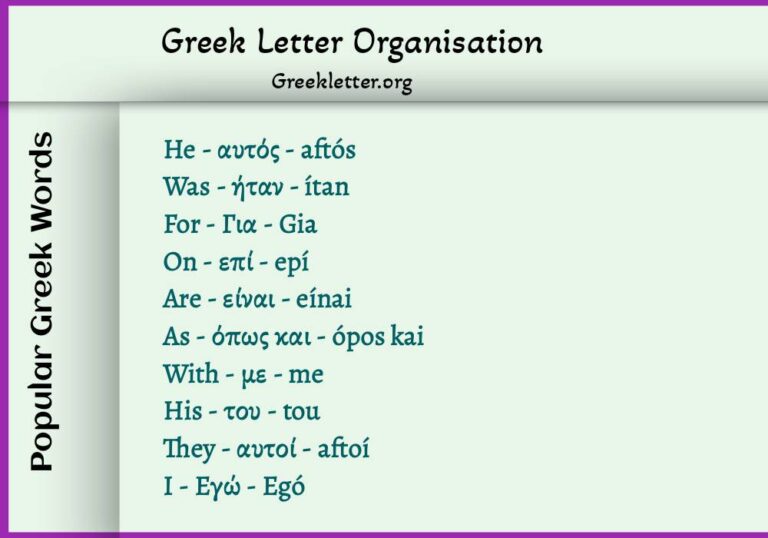Greek Prefixes Numbers 1-20: Learn Numerals Quickly
The Greek number system is a fascinating aspect of ancient mathematics that has influenced countless cultures and languages throughout history. From the mighty Roman Empire to the modern world we live in today, the foundation of counting and numerical representation owes much to the Greeks.
In this article, we will delve into Greek prefixes numbers 1-20, unraveling their meanings and exploring their significance in shaping our understanding of mathematics.
Prepare to embark on a journey through time as we unravel the mysteries behind these numerical symbols that have stood the test. The Greeketter.org is the perfect way to learn the Greek language alphabet and numbers.
Greek Prefixes Numbers 1-20
In Greece, the number system is unique compared to other countries. The numbers 1 to 20 have their special names, different from the cardinal numbers we use in English. Here’s a look at how to say and write the Greek numbers 1 to 20.
The first 10 Greek numbers are: ένα (ena), δύο (dyo), τρία (triá), τέσσερα (téssera), πέντε (pénte), έξι (éxi), επτά (eptá), οχτώ (ochtó), εννιά (enniá).
In Greece, ten is pronounced as “eh-ka” and 20 as “eh-kee.” The numbers 11 through 19 are all based on these two numbers.
For example, 11 would be said as “eh-ka-eh” and 12 as “eh-kee-eh.” 13 is “eh-ka-teh,” 14 is “eh-kee-teh,” 15 is “eh-ka eh,” 16 is “eh kee eh,” 17 is “eh ka teh,” 18 is ” eh kee teh” and finally 19 which is said as ” eh kea eh.”
- 0 – μηδέν
- 1 – ένα
- 2 – δύο
- 3 – τρία
- 4 – τέσσερα
- 5 – πέντε
- 6 – έξι
- 7 – επτά
- 8 – οκτώ
- 9 – εννέα
- 10 – δέκα
- 11 – έντεκα
- 12 – δώδεκα
- 13 – δεκατρία
- 14 – δεκατέσσερα
- 15 – δεκαπέντε
- 16 – δεκαέξι
- 17 – δεκαεπτά
- 18 – δεκαοκτώ
- 19 – δεκαεννέα
- 20 – είκοσι.
From 1 to 20: A Comprehensive Overview of the Greek Number System
The Greeks are a fascinating people with a rich culture and history. They have also been extremely influential in the development of Western civilization.
One area in which they have had a significant impact is the field of mathematics. The Greek number system is one of the most commonly used systems in the world today.
The Greek number system is based on the decimal system, with numbers ranging from 1 to 10. However, some unique features of this system make it different from other decimal systems.
| Must Read |
For example, the number 7 is considered a perfect number and is therefore given special treatment. In addition, a few other numbers have special meanings in the Greek system, such as 3 and 9.
Overall, the Greek number system is relatively simple and easy to understand.
The Greek number system is one of the simpler and easy-to-understand systems used by ancient cultures.
Although there are some complexities, such as how numbers can be represented, the overall system is easy to grasp.
Using letters to represent numbers is one of the most straightforward aspects of the system, and once someone understands this basic concept, they can begin to understand how the system works.
How the Greek Alphabet Changed the Way We Count
In the early days of counting, people used tally marks to keep track of various items. This worked well enough for small numbers, but as quantities increased, keeping track of everything using tally marks became more difficult.
The Greeks were the first to develop a written numbering system that used symbols for each number. This system, which we now know as the Greek alphabet, changed how we count and make it possible to write larger numbers.
The Greek alphabet consists of 24 letters, each representing a different number. The first ten letters (from alpha to iota) represent the numbers 1 to 10, while the next ten letters (from kappa to lambda) represent 20 to 100.
The final four letters (mu, nu, xi, and omicron) represent 1000, 10000, 100000, and 1000000, respectively.
Did you Know You Can Convert Greek Letters to Numbers?
You might be familiar with Greek letters if you’re a math or science enthusiast. Did you know that you can convert Greek letters to numbers?
The letters of the Greek alphabet are often used in mathematical and scientific equations. Each letter has a numeric value that can be used in calculations.
For example, the letter “alpha” has a value of 1, “beta” has a value of 2, and so on. If you know the letters’ numeric values, you can use them to solve equations.
So next time you see a math problem with Greek letters, don’t panic! Just convert the letters to numbers and solve away.
Uncovering the Secrets: What the Numerical Values of Greek Letters
The numerical value of Greek letters has been a mystery for centuries. Many theories have been put forth, but no one knows for sure.
Some believe the ancient Greeks assigned the numbers based on their beliefs about the cosmos. Others think that the numbers were chosen for practical reasons, such as making it easier to calculate sums.
Whatever the reason, the numerical values of Greek letters are fascinating. They offer a glimpse into the ancients’ minds and provide a way to understand the universe differently.
The Mysterious Origins of Acrophonic Greek Numerals
The ancient Greeks were a clever people. They developed one of the first writing systems, and their language has influenced Western culture for millennia. One mystery that has puzzled scholars is the origins of acrophonic Greek numerals.
Acrophonic Greek numerals are letters of the Greek alphabet that represent numbers. The number one is represented by the letter alpha, two by beta, three by gamma, and so on. The Greeks used this system from about the eighth century BCE until the third century CE.
There are several theories about how this system developed, but people have yet to learn. One theory suggests that it was based on an early form of counting using pebbles or sticks. Another theory suggests that Egyptian hieroglyphs inspired it.
Conclusion Points
Learning the Greek numbers can be a great benefit to students. It can help them understand mathematics and science concepts, and it can also improve their problem-solving skills. In addition, learning the Greek numbers can help students develop a better understanding of the world around them.
In conclusion, learning about Greek numbers is a great way to strengthen your math skills. The 1-10 numbering system is an easy way to remember the order of operations and can be used in various situations.
Additionally, these numbers can be used to make calculations and are essential for learning other foreign languages. So, start learning about Greek numbers now!
FAQs
The FAQs section of Greekletter.org is a great way to learn more about the Greek language and culture. In this section, you can find important questions and answers about Greek numbers 1 to 100. This is a great resource for anyone interested in learning more about the Greek language and culture.
Question (1) – How to read 11 in Greek numerals?
Answer: In Greek numerals, 11 is written as “ΙΟΥΔΗ”. The first letter of each number (1-10) is written in the same order but with a little extra symbol to show that it is a number. So, Ι is written next to 5 (5-Ι), and so on.
Question (2) – How to write 14 in Greek numerals?
Answer: In Greek numerals, 14 is written as “14”. To write this number in full, one would write “14 η αξία”. This is read as “fourteen powers” or “fourteen squared.” To write 14 in Greek numerals, divide five by 6 (which equals 1.4) and then add the result to 14 (which equals 15).
Question (3) – What is the Meaning of 14 in Greek Numerals
Answer: The number fourteen has a complex history in Greek numerals. It is the sum of thirteen and fifteen, and thus, it represents perfection or completeness. It also had religious significance because it is the fourteenth day of the month (when we add up the numbers 1-13, we get 14).
Question (4) – How to Count to 12 in Greek?
Answer: There are many ways to count to 12 in Greek. One way is to use the ordinal number system. This system is based on the numbers 1-12.
You would say “one,” “two,” “three,” and so on until you get to “twelve.” Then you would say “thirteen,” and so on. Another way to count to 12 in Greek is by using the decimals system. This system is based on the numbers 1-10.
Question (5) – How to Write 16 in Greek Numerals?
Answer – A five- or six-digit number written in the Roman numeral system is read from left to right. The first letter of each number is pronounced, and the numbers are pronounced in order, starting with the number one. So, 16 would be read as “one-sixteenth” (pronounced “Centro”).
Question (6) – What does the Greek number 17 represent?
Answer – The Greek number 17 typically represents the word “tetraktys.” Tetraktys is a term in mathematics and physics that refers to a four-dimensional object.
The most common use of tetraktys is in the theory of the Pythagorean theorem, which states that a right triangle has the length of its longest side, or hypotenuse, in terms of the other two sides.
Question (7) – What are the Greek numbers one to ten, and why are they important?
Answer: The first ten numbers are important in mathematics because they are used to create basic concepts and formulas.
The first number, one, is the base used to create all other numbers. For example, the number two can be created by adding one-to-one.
The next number, two, is created by multiplying one by two. The next three numbers (three, four, five) are created by adding one to two and dividing the total by two.
Question (8) – What is the history behind the Greek number system?
Answer: The Greek number system is the world’s most widely used numeral system. It is based on the principle that a combination of letters from the alphabet can represent each number.
There are twenty symbols in the Greek system, which are divided into five groups. These groups are 1-10, 11-20, 21-30, 31-40, and 41-50. Each letter of the alphabet is assigned a different symbol.
Question (8) – Who invented the Greek number system?
Answer: The Greek number system is a positional numeral system used in mathematics and business. It was invented by the mathematician Euclid in the 3rd century BC.
Question (10) – What are Greek number prefixes?
Answer: Greek prefixes are used to indicate the position of a number within a sentence.
For example, “de” before a number indicates that it is the second number in the sentence, following the word for “number.” The prefix “meta” is also used to indicate that a number is the first in a series; for example, “de meta” means “five after.
Question (11) – How do Greek number prefixes work?
Answer: In the English language, we use a lot of Greek prefixes. For example, “mono-” means one, “bi-” means two, and “tri-” means three. But how do these prefixes work?
When a Greek prefix is added to a word, it changes the meaning of the word. For example, “telephone” means “far away voice.” But if we add the Greek prefix “tele-,” which means “far,” to the word “phone,” it changes the meaning of the word to “far-off voice.”
Greek prefixes can also be used to create new words. For example, the Greek prefix “iso-” means “equal.” Adding this prefix to the word “meter” creates a new word: “isometer.” This new word means “a device for measuring something.






